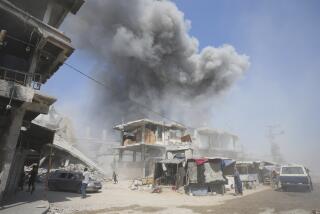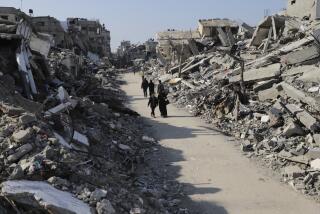Serb Shelling Foils Rescue of Bosnians : Balkans: U.N. peacekeepers are attacked as they try to evacuate the wounded from besieged Srebrenica.
- Share via
BELGRADE, Yugoslavia — U.N. peacekeepers aborted a rescue mission for severely wounded Bosnian Muslims on Wednesday when Serbian rebels rained down artillery shells on three French helicopters as they began the evacuation from the town of Srebrenica.
Serbian leaders denied firing on Srebrenica.
Only 21 of more than 200 casualties deemed emergency cases were flown out of the besieged town to the Muslim stronghold of Tuzla in eastern Bosnia-Herzegovina before the mission was suspended because of the artillery targeting the operation, said Lyndall Sachs, spokeswoman for the Office of the U.N. High Commissioner for Refugees.
Whether the evacuations can be resumed soon “is going to depend very much on the security situation,” Sachs said, noting that the soccer field used as a staging area was under sustained attack.
Two Canadian peacekeepers were among those wounded when Serbian gunners, violating an agreement that U.N. commanders had negotiated with Serbian political leaders, opened fire on the French helicopters lifting off with the first stretchers.
“One of the U.N. personnel was severely wounded, but his condition has stabilized,” said Nina Ijacic, a spokeswoman for the U.N. Protection Force (UNPROFOR) office in Belgrade.
Three local civilians were killed by the bombardment, including a child who was evacuated but died just one minute before the helicopter touched down in Tuzla, a source with the U.N. refugee agency said.
Two British helicopters later picked up the two Canadian casualties and some other wounded, but U.N. relief and military officials decided against further mercy flights until they receive more reliable assurances of safety from the Serbs.
In a radio transmission to U.N. headquarters in the town of Kiseljak, one aid worker in Srebrenica warned that “if no cease-fire can be arranged immediately, the world will have to decide whether to abandon Srebrenica or evacuate civilians to prevent huge numbers of civilian casualties.”
Shells also rained down on the Tuzla airfield from which the French Puma and British Sea King helicopters took off for the dangerous flight across some of Bosnia’s most fiercely contested territory.
A senior officer of the U.N. peacekeepers in Kiseljak fired off a letter of protest to the Bosnian Serb military commander, Gen. Ratko Mladic, accusing his forces of “deliberate interference with humanitarian efforts.”
British Brigadier Roddy Cordy-Simpson, chief of staff for the U.N. mission in Bosnia, described the attacks as “the ultimate in despicable behavior.”
At U.N. headquarters in New York, U.N. Secretary General Boutros Boutros-Ghali called on Bosnian Serb forces to halt their “unjustifiable” attack on Srebrenica. And one of the co-chairmen of the Bosnia peace talks, Lord Owen, went to see Bosnian Serb leader Radovan Karadzic at his hotel to protest the shelling.
Owen’s spokesman, Fred Eckhard, said the former British foreign secretary protested to Karadzic the “outrageous” shelling of Srebrenica and Tuzla, and a two-hour delay of the French helicopters at Zvornik, where Serbs meticulously searched the craft.
Leaders of the Serbian militia denied firing their artillery, and in a statement to the Belgrade-based news agency Tanjug, accused the U.N. Protection Force of dropping explosives around the Srebrenica landing area to frame the Serbs.
The statement said that a helicopter of the U.N. forces had opened fire on Serbian positions but that the Serbs did not return fire.
“UNPROFOR’s aim was not to evacuate the wounded but to infiltrate its troops into the area to protect Muslim forces,” the statement said.
Bosnian Serbs, who have been waging a nearly monthlong campaign to conquer the last Muslim enclaves in eastern Bosnia, also continued to block convoys of food and medical aid destined for those holdouts. Some of the trucks that had been parked at the Bosnia-Yugoslav border for five days headed back to Belgrade with their cargoes, said Sachs, the U.N. refugee agency spokeswoman.
Karadzic, who is in New York for the peace talks, had guaranteed that the evacuation would be allowed to proceed unimpeded and that U.N. relief convoys would be granted safe passage through territory that his forces control.
No relief convoys have been allowed into Serb-controlled territory since Friday, when the commander of U.N. forces in Bosnia, French Gen. Philippe Morillon, dramatically piloted an 18-truck procession into starving Srebrenica amid a hail of gunfire and without a military escort.
While Morillon’s act of daring is thought to have saved lives in Srebrenica, where 60,000 Muslims are holed up under constant siege, Serbian rebels have refused to let any aid in to eastern Bosnia since then. They also have insisted that any future convoys travel without U.N. protection.
Sachs said there has been no policy shift on escorts.
“We will continue to look at this on a case-by-case basis,” she said.
The U.N. refugee agency meanwhile fulfilled its pledge to help Serbs in Tuzla who wanted to leave.
Serbian gunmen in the Bosnian border town of Zvornik had insisted that the United Nations bring out 272 Tuzla Serbs who they suggested were captives. Sachs said 46 Serbs wanting relocation were located by her staff but said she knew of no instances in which the Serbs were being held against their will. Most of those listed preferred to stay in Tuzla, she said.
The Sarajevo government has accused U.N. relief workers of complicity in the Serbian policy of “ethnic cleansing” by helping the forcible separation of ethnic groups. Local Muslim leaders fear that the departure of thousands of Serbs would make Tuzla more vulnerable to rebel attacks.
More to Read
Sign up for Essential California
The most important California stories and recommendations in your inbox every morning.
You may occasionally receive promotional content from the Los Angeles Times.














